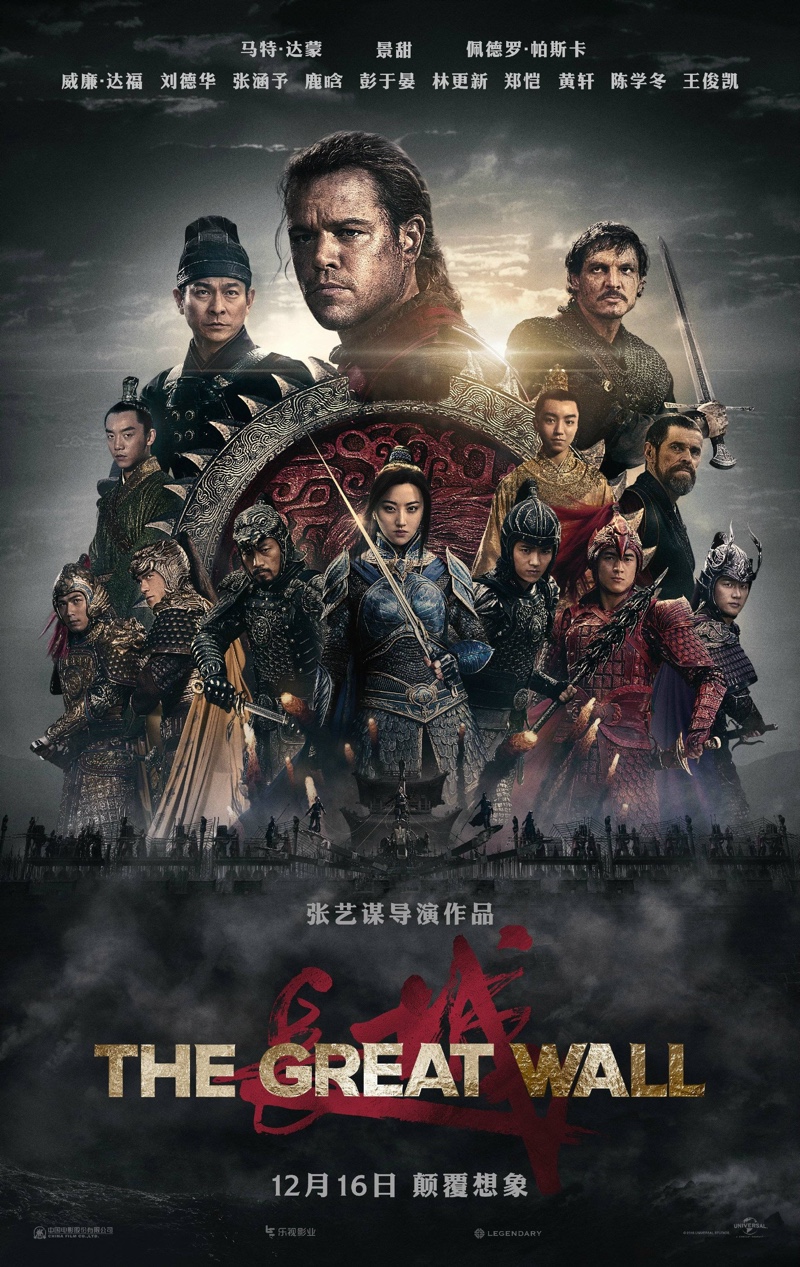If the protagonist wasn't white, we wouldn't be talking about this film. If a Chinese-American actor had been cast in the role, there is no doubt that they would have been asked to speak Chinese. In fact, many aspiring Chinese-American actors go to Hong Kong and China to pursue their acting careers.
Wang Leehom, for example, would have been a perfect candidate for the role, but then it would have only been popular in China and would likely have seen an Asia-only release. He is a Chinese-American superstar in China. It would have made more sense for him to speak Chinese than to have all of the other actors speak English, though. If you make an English-language film with an entirely Chinese cast, it ends up being another
Crouching Tiger, Hidden Dragon: Sword of Destiny with people clamoring to know why the film wasn't filmed in Chinese.
This film was designed specifically for an international release. These kinds of big-budget action-fantasy films are not new to Chinese cinema.
League of Gods was released just a few months ago; it features an all-star cast.
[YT]6_xbjElATtI[/YT]
Here's the fourth highest-grossing film of 2014 in China:
[YT]HLA6IVAPYrg[/YT]
And the third-highest grossing film of 2014 in China:
[YT]FgXdrN5SCuQ[/YT]
Film stars abound in these movies. Few people in the West watch them or even know about them except for the Chinese diaspora.
If you want a real historical epic, watch
Red Cliff. There are dozens of war movies in recent Chinese cinema, but
Red Cliff still stands out at the top.
What makes
The Great Wall unique is its crossover appeal to the West. It stars a marquee Hollywood actor who, regardless of his role, will put Western audiences in seats as long as he is marketed as the star. The studio succeeded in putting Westerners in seats while also fueling Chinese nationalism and upholding the conventional relationship with foreigners in Chinese cinema.
Any time a Chinese film deals with foreigners, the result is usually the same: they are treated as lesser characters who are either entirely evil, require the guidance of Chinese wisdom, or are virtuous and subsequently give their seal of approval to their Chinese counterparts.
Dragon Blade does exactly this, with John Cusack portraying a noble bodyguard who befriends and gains respect for Jackie Chan and the Chinese army. In that film, Adrien Brody plays Tiberius, a ruthless Roman soldier who murders his father, then blinds and eventually kills his preteen younger brother in order to gain status and power.
As soon as this film was announced, I posited what I felt Dafoe and Damon's roles would be; I was right.
Chinese people are very proud of their ethnic heritage, culture, and values, to the point of boasting about it to others. Chinese identity is a point of contention among Chinese people, and when they have an opportunity to flaunt their values and brag, they do so.
http://www.scmp.com/comment/insight...and-china-hong-kong-and-taiwan-should-realise
It's not unusual for Chinese people to discriminate against the Chinese diaspora either; Daniel Wu noted that when he went to China, people gawked at him at a restaurant and were surprised that he knew how to use chop sticks.
Mainland, Taiwanese, Hong Kong, and Western-Chinese people tend not to socialize with one another. They tend to remain within their own groups and can be prejudiced towards one another, although Western Chinese people are much less discriminatory towards the other groups than vice versa.
Former Washington State governor Gary Locke was recently called a "rotten banana" by Chinese state media, the metaphor being pretty apparent.
http://news.nationalpost.com/news/r...ameless-editorial-on-departing-u-s-ambassador
Here's an exchange in Hong Kong between a native Hong Kong resident and a white motorcyclist:
[YT]XzGaZ1DZ4QE[/YT]
In the comments section, there are a bunch of people trying to distinguish "Hong Kongese" from "Chinese." Note that "gweilo" is a Cantonese derogatory term for white people, meaning "white ghost;" it is also
the primary word used to identify white people in Cantonese.
I tried to watch
From Vegas to Macau recently and saw a gag that many would consider to be racist in the West; check out 14:55:
[YT]5BIx4nfZFAA[/YT]
One of the protagonists is stunned that a woman he finds attractive is with Chow Yun-fat's character; when he goes to hug her, she shuffles out of the way and he ends up hugging a black guy instead. When he looks up and sees who he is hugging, he walks away crying. This film is the fourth film in the extremely popular
God of Gamblers film series, which currently has six installments.
http://www.huffingtonpost.com/entry/china-racist-black-people_us_576a9840e4b065534f485002
A common belief among Chinese descendants is that the more Chinese a person is, the better. Ethnic, national, and cultural pride are very important among people of Chinese descent. Chinese people are very nationalistic as a whole, whether their heart is with China, Hong Kong, Taiwan, Macau, or any other place. There is no doubt that, in this context,
The Great Wall encourages Chinese nationalism.
Damon's character is designed to be a punching bag.
One clear distinction must be made: you will see a lot of anti-Japanese sentiment in Chinese and Hong Kong films due to resentment from the atrocities committed by the Japanese to many Chinese communities and Chinese people before and during the Sino-Japanese War, e.g., 6 to 8 million killed. These actions are considered to be war crimes. Japanese denial or misrepresentation of these actions and lack of remorse have had a strong effect on depictions of Japanese people in Chinese cinema and on Chinese opinions of Japanese people as a whole. This is unrelated to the issues discussed above and should not be conflated. There is a difference between nationalism, disliking foreign cultures, and being enraged by genocide.
https://en.wikipedia.org/wiki/Japanese_war_crimes
https://en.wikipedia.org/wiki/Rape_of_Nanjing


